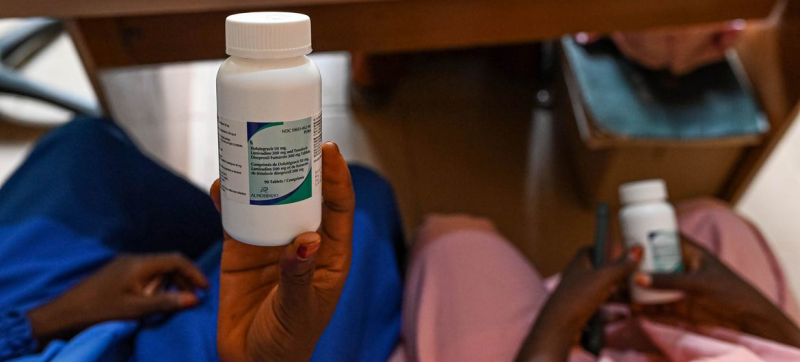- Israel Strikes Tehran with US Support Amid Nuclear Tensions |
- India Sees 9% Drop in Foreign Tourists as Bangladesh Visits Plunge |
- Dhaka Urges Restraint in Pakistan-Afghan War |
- Guterres Urges Action on Safe Migration Pact |
- OpenAI Raises $110B in Amazon-Led Funding |
Africa Begins HIV Drug Shift with Locally Made Medicines

Women receive antiretroviral therapy for HIV at a clinic in Kaduna state of Nigeria. (file)
Sub-Saharan Africa has taken a cautious but critical step towards greater health self-reliance, as locally produced HIV medicines and diagnostic tests begin reaching national programmes — including, for the first time, the procurement of African-made treatment for Mozambique.
This marks a milestone for a region that bears nearly 65 per cent of the global HIV burden and has long depended on imports of life-saving antiretroviral medicines and testing kits. That may now be beginning to change.
The human immunodeficiency virus (HIV) weakens the body’s immune system, reducing its ability to fight infections and certain cancers. Without timely intervention, it can progress to acquired immunodeficiency syndrome (AIDS), the most advanced stage of the infection.
In 2023, Kenya-based pharmaceutical company Universal Corporation Ltd became the first African manufacturer to receive World Health Organization (WHO) prequalification to produce tenofovir disoproxil fumarate, lamivudine and dolutegravir (TLD) – a first-line antiretroviral therapy for HIV.
Now, in a major step forward, the Global Fund – a worldwide partnership financing responses to HIV, tuberculosis and malaria – is procuring this locally produced HIV treatment for Mozambique. This marks the first time African-manufactured TLD is being deployed through this channel.
“The procurement of the African-manufactured first-line HIV treatment by the Global Fund for Mozambique is a great milestone towards strengthening supply chain systems in Africa,” said Meg Doherty, Director of WHO’s Global HIV Programmes.
“This will contribute to better health outcomes for people living with HIV who need uninterrupted medicine supplies.”
WHO says this achievement is part of a broader push to bolster local production capacity and improve access to essential health technologies across Africa. The agency has been partnering with countries, manufacturers, and global health organisations — including the Global Fund and Unitaid — to expand quality-assured African manufacturing.
“Local production of quality-assured health products is an urgent priority,” said Rogerio Gaspar, WHO Director for Regulation and Prequalification.
“With every African manufacturer that meets WHO prequalification standards, we move closer to a more self-reliant, resilient and equitable health system.”
Despite the breakthrough, WHO cautioned that production alone is not enough. For long-term sustainability, it called for advanced market commitments, fair procurement policies, and ongoing technical support.
WHO also pointed to diagnostics as a critical gap. With donor funding shifting, many countries are under pressure to maintain HIV testing programmes, which are essential to both prevention and treatment.
In a related move, Nigerian diagnostics company Codix Bio recently received a sublicense to manufacture rapid diagnostic tests for HIV.
“Having locally produced HIV rapid tests will help increase affordability, and more broadly address supply chain vulnerabilities and delays in access to diagnostics,” said Dr. Doherty.
To sustain progress, WHO is encouraging countries to adopt low-cost, WHO-prequalified rapid HIV tests, particularly as the first test in national algorithms. This could significantly cut costs while maintaining service delivery.
While the update marks tangible progress, WHO stresses that more action is needed.
“Locally manufactured TLD is a major step towards that goal,” the agency said, “but more action is needed.”

